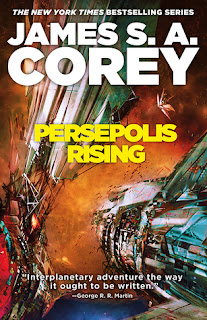Persepolis Rising is the seventh in James S.A. Corey’s ‘Exapnse’ grand space opera series. The
Expanse has always fused hard-hitting action with relatable characters in a
sweeping cosmos- and that tradition continues here.
Persepolis Rising is, at least in part, a book about legacy.
Don’t get me wrong, it’s also a book about change, about insurgency, about
family, about hard fought victories and bitter defeats. But the idea of legacy
was one which stuck with me as I turned the pages. Holden and Naomi, two of the
central protagonists of the series, are starting to feel the weight of their
years. They’ve fought the good fight and saved the world multiple times, but
heroism isn’t an especially forgiving gig. They’re tired – even Holden’s
relentless idealism has had the sharp edges filed off it over the years. This
consideration of what happens to folk heroes after they’ve done their time in
the saddle is fascinating. Legacy is also a concern of the antagonist – an
individual determined that humanity will be prepared to face the challenges
thrust upon it as it enters a wider universe. Where Holden and Naomi have a
legacy, this is a more targeted approach to immortality. Here is an individual
who wants humanity to survive and throve, and believes that having one leader,
with one vision, rather than a multiplicity, is the way to achieve this. It’s
slightly terrifying to find that the arguments presented are plausible, the
ideology resonant, if also repulsive. Here is a person with a grand, sweeping vision
of humanity, one which is a response to the factors driving a new galactic
society. That the vision is backed by atrocities, and the society by military
force, is almost ancillary.
If Holden and the Rocinante crew are aging heroes, their
opposition is energised, vital, and downright plausible. They’re not ravening
hordes of unreasoning zealots, but individuals prepared to put themselves on
the line for humanity, just as our protagonists are. That lets us see them as
sympathetic and human, as part of the whole, rather than as an ‘other’ – and that
very humanity is part of what makes them so relentlessly terrifying.
Anyway. Many of my old favourites are here – Holden, Naomi,
Amos and the rest of the Rocinante gang. Seeing them react to sea-changes in
their relationships, in the way which they interact with each other, is
delightful. They’re a family, yes, but one with the familiar level of squabbles
and strife. At the same time, they’re also able to back each other to the hilt.
Reading about the Rocinante again is like a warm bath – comfortable, relaxing,
enjoyable. We also get the point of view of one of their antagonists – which is
humane, relatable, charming, and as a consequence, rather worrying. Sitting in
the head of a man with ideals isn’t as strange as all that - witness our time
with Holden. It’s a nuanced portrayal of a complex individual, on willing to do
anything in service of their goal – and it’s a point of view which by its very
every-day humanity evoked unease in me as a reader. I’d recommend the book for
this nuanced portrayal of an opponent alone; that it mixes with a loving and unflinching
gaze on the crew of the Rocinante, and their own slow decline into obscurity,
makes it downright wonderful.
Plot-wise, this – well, it’s the Expanse. There’s some
marvellously choreographed space-battles, if those are your thing. The tension,
the sense of velocity and human cost, kept me on the edge of my seat. The
feeling that both words and actions mattered was constant, and as the stakes
and effects mounted, the narrative kept me committed to seeing it through.
Alongside these are some compelling scenes of struggle on the ground – and the
text isn’t shy about exploring themes of collaboration, terrorism, the effects
and aftermaths of actions on all sides. It’s sharply observed, bloody-edged
work, and it’s certain to keep you wondering what happens next.
As with preceding books, this one comes with some big ideas.
There’s galaxy-spanning transport networks, and discussions about how far one
can go in service of humanity. There’s grand visions and ideas that surge off
the page like a fire in the brain. But they’re backed by quieter, complex
moments, where everyone makes their own decisions. Where the ‘bad guys’ are
heroes in their own minds, and where even the heroes have to make hard choices
and bear the consequences.
Is this worth reading? If you’re new to The Expanse series,
you may want to go back to the beginning, and see if its blend of hard sci-fi,
human drama and high concept is for you. If you’re all caught up – then yes,
you need to read this. It throws open entirely new questions about what’s going
on, and what will happen next, and it does so by exploring big ideas through
very human experiences, and a willingness to explore both rewards and costs. It’s
an absolute cracker, and a must-read for any fan of the series.

No comments:
Post a Comment